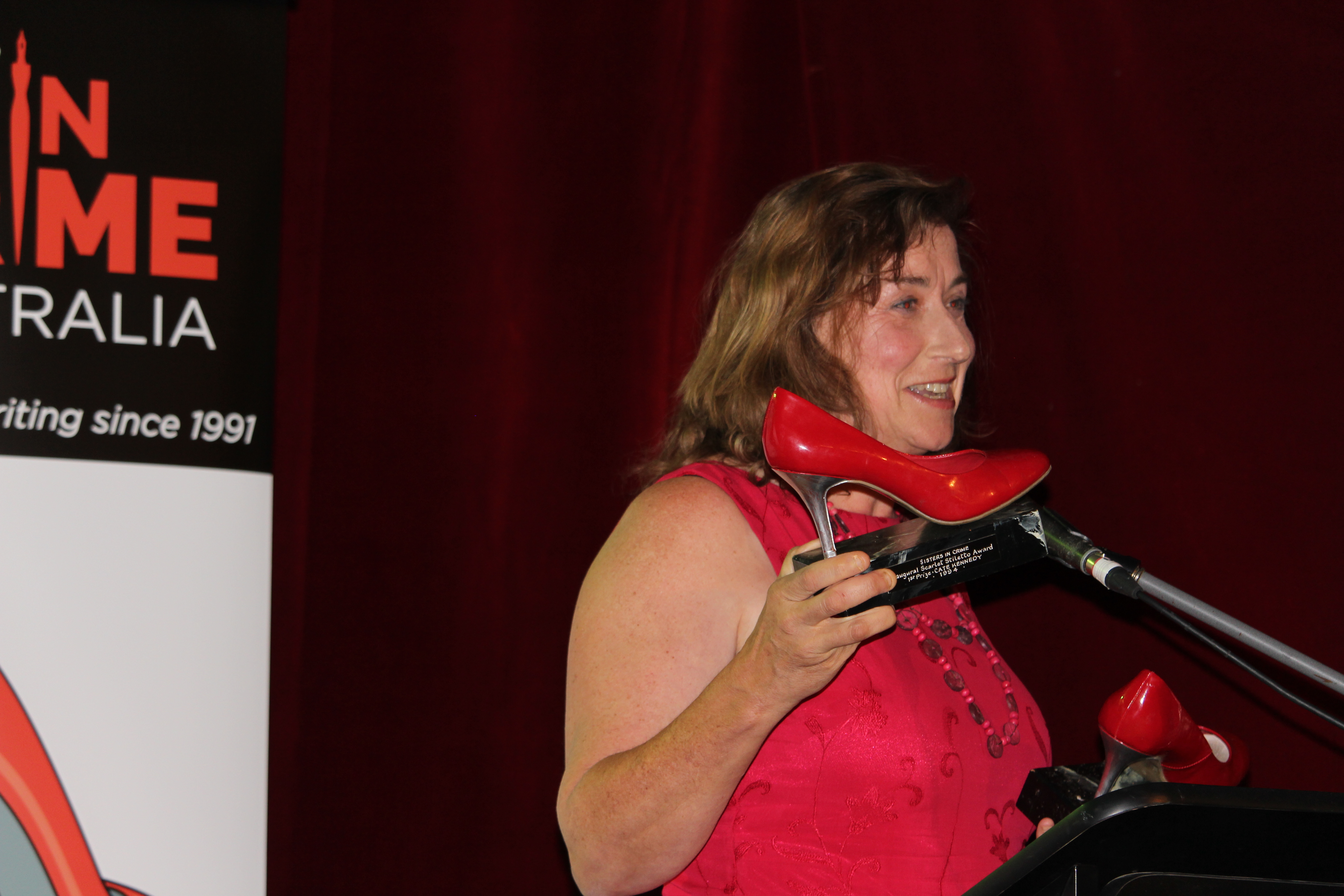Cate Kennedy, who won the first two Scarlet Stiletto Awards in 1994 and 1995, gave an hilarious and subversive keynote address entitled “These heels are made for walkin’”, to the 25th Scarlet Stiletto Awards ceremony on Saturday night (24 November) at Melbourne’s Thornbury Theatre.
Cate came up with an alterative to the award – the Scarlet Scuff Award. After a stinging attack on V. S. Naipaul who condemned women writers for their “sentimentality” and “narrow view of the world”, she led the crowd in singing “These shoes were made for writing”, a spoof on the Nancy Sinatra standard.
Here’s what she had to say:
25 years of the Scarlet Stiletto award, and what a difference a quarter decade makes.
25 years ago co-convenor Carmel Shute modeled a Sisters in Crime t-shirt which said, “It’s criminal what a girl has to do… to get a good read’ Clearly many of you here chose the non-criminal path and decided to just go ahead and write crime fiction yourselves, which strikes me as quintessentially female: “Forget it! I’ll do it myself! ” Get out of the way when that happens.
To date, almost 3500 stories entered over the running of the competition, and here’s a statistic you’ll like – for every year of the award’s history an award winner has gone on to have a novel published – that’s 25 years of prizes, and 25 published books, and I know, because I’m one of them myself, countless more women writers out there getting on with it, honing their craft, trying to find desk space in the spare room, writing short stories and new manuscripts all the time.
I notice in the publicity material that I am touted here as a ‘short story guru’ but I know I’m with my tribe tonight so I don’t need to pretend any expertise. You know and I know it’s not about expertise, and it’s not really a competition. We’re all in this together.
The real story guru experts are fond of telling us there are only really two stories in the universe: “Someone goes on a journey” and “A stranger comes to town.” Well, in 1994 a stranger came to my town in the form of a bunch of leaflets, sent by a group I’d never heard of, called the Sisters in Crime. They were sent to the library, and I might never have seen them except that as it happened I was the librarian, so I got to stack them on the desk next to the flyers about the U3A Walking Group and the Neighbourhood House Open Day.
What I spent a lot of time doing in that library was reading. I should have been stacking and shelving and collecting 10c fines but mostly I used Council time to work my way slowly through the crime section, which sure beat the large print westerns and large print romances which took up a lot of shelf space in that library.
I read indiscriminately but found a new genre for myself, stories published during the 80s by The Womens’ Press (logo: a small iron) and those from the Golden Age of Crime writing, the classic murder mysteries – there were plenty of them and there were plenty by women authors, who dominated the field, in my opinion.
I had studied creative writing as a young person, then had written nothing for a decade at least. Peaked early, I thought. Got interested in other stuff. But I have to say reading so much crime fiction, especially short stories by female authors – which were very thin on the ground by the time I was selecting new stock for the library with my own tastes in mind – set up a bit of a restless itch in me. I thought: “I wonder if I could do that.”
But even if I could, where would I start? I didn’t belong to Writers Victoria, there was no internet back then, I was pretty clueless, pretty unambitious, pretty half-arsed. (One thing I’ve learned since – if you’re going to bother pursuing a passion, it’s good to apply the whole arse to the job).
And then the stranger came to town – a friendly entry form, inviting women to write and submit a short story with a crime focus and a female protagonist.
I went home and wrote one. And strangely, someone went on a journey. Me, not my protagonist. Although I learned a lot about protagonists in the writing.
The crime genre gives us a classic third structure. Someone wants something, and can’t get it. They go out and try to get it. That thing is a longing – for order, for setting things straight, for solving a puzzle or problem. For bringing justice to an unjust world. To go into a dark place to try and bring coherence to an incoherent, arbitrary, chaotic mess which often looks very like reality.
I don’t want reality. I want the symmetry of story, its cause and effect, its crystallizing narrative consequence, its insights into fallible flawed heroes and their unreliable, complex inner motivations. A world where we can be sitting in an easy chair by the fire and still get to experience the dopamine rush of peril and salvation and the vicarious thrill of pitting our wits against those of imaginary characters who are so unsettlingly like ourselves and yet so intriguing. I want death made comprehensible, and baffling mysteries made clear.
I want the fog to lift! I want a solution! I want to keep writing it just as much as you want to keep reading it, and for the same reasons: because life is baffling, scary and incoherent, and I want to navigate it with something that explores the universe’s own mysterious retributions and redemptions. I wouldn’t have started on this particular journey, I don’t think, without the invitation and encouragement and enthusiasm of Sisters in Crime. Sometimes someone’s there in the right place at the right time to push the right lever, the one you can’t see for looking, and it’s very often a woman, in my experience. I’m thrilled to be here tonight as part of that tradition to celebrate a network of such support and alliance.
Now, I won a pair of shoes in ‘94 and ‘95, and was a bit freaked out having the stiletto blade glinting on the bookshelf, so I gave the shoes away to a friend who put them on display in her very whimsical sculpture garden, and kept the bases as bookends.
The Scarlet Stiletto committee, of course, saw the stiletto as a feminist play on the traditions of the genre, saying “the stiletto is both a weapon and a shoe worn by women. And of course, the colour scarlet has a special association for women.”
 Well, that’s true. But I’ve just never been a girl to wear stilettos. Firstly, because I have size 11 feet, and most stilettos made in my size are designed for drag queens and feature a lot of patent leather. Also, having shoes that pinch and stop you running across the street has always seemed a bit of an impediment. Which is why these shoes I’m wearing tonight are actually orthopedic Homy Peds, from their formal range. I don’t get out enough to justify wearing anything else.
Well, that’s true. But I’ve just never been a girl to wear stilettos. Firstly, because I have size 11 feet, and most stilettos made in my size are designed for drag queens and feature a lot of patent leather. Also, having shoes that pinch and stop you running across the street has always seemed a bit of an impediment. Which is why these shoes I’m wearing tonight are actually orthopedic Homy Peds, from their formal range. I don’t get out enough to justify wearing anything else.
Which is why I’ve come up with an alternative trophy, for those who’ve been homebound and at the desk for a while, and who’ve been doing this – by this, of course, I mean the serious work of subverting the dominant patriarchal paradigm, one sentence at a time – for a while now.
I’ve developed a prototype I’ve christened the “Scarlet Scuff” award. The base is a packet of Tim Tams. This award is for the writers winning stilettos tonight, who think they might be in the writing game for the long haul. Believe me, you’ll thank me in twenty-five years time.
And for those of you who also write, and who possibly began this journey, as I did, around a quarter century ago, I take my hat off to you in solidarity. This is invisible work, really, but in my experience all the best work is. It’s not the work that’s performative or public, it’s what you make that matters. That’s what changes things.
The famous writer V. S. Naipaul died a couple of months ago. Naipaul was asked in 2011 if he considered any woman writer his literary match. He replied: “I don’t think so.”
Of Jane Austen he said he “couldn’t possibly share her sentimental ambitions, her sentimental sense of the world”. He said: “I read a piece of writing and within a paragraph or two I know whether it is by a woman or not. I think [it is] unequal to me.”
Naipaul said this was because of women’s “sentimentality, the narrow view of the world”. “And inevitably for a woman, she is not a complete master of a house, so that comes over in her writing too,” he said.
In that same interview he added: “My publisher, who was so good as a taster and editor, when she became a writer, lo and behold, it was all this feminine tosh. I don’t mean this in any unkind way.”
No. Well, I don’t mean this in an unkind way, Mr. Naipaul, but I’m imagining you now in some ethereal waiting room in the afterlife, where nobody has read anything you’ve ever written, and nobody cares less about your opinions or your pretensions. There’s a variety of doors leading out of the room and clearly, you’re readying yourself for literary heaven, where gentlemen like you sit around drinking port and polishing up witty things to say about themselves, and sulking when somebody else dares to butt in. But no, Mr. Naipaul. You are led unerringly to another door, which is not heaven. At least, not for you.
The door slams shut resoundingly behind you and the room is full of women. And oh my god, the noise, Mr Naipaul! It’s all a racket of sentimentality and a narrow world view, an excited, hilarious buzz of feminine and feminist tosh. And lo and behold! You are handed a tray of drinks, and told to get a move on and pass them around, quick smart. You’re not the guest of honour tonight, sadly. Those days are done, Nobel Prize or not. While you’ve been sitting pontificating, things have been up and moving.
The swings and roundabouts do their thing, and you’re not even on the ride any more. Nobody cares who you think is or isn’t a ‘complete master of the house’ at this party, because it’s not your house, and mastery – and you had a lifetime to learn it, just like the rest of us – is about more than being a master.
Quick, back to the bar and replenish those drinks, Naipaul. It’s very thirsty work, being a female crime writer. And would it kill you to smile?
 And who’s that stepping up to the microphone to sing, god forbid? Is it Jane Austen? Is it your editor and publisher, who probably ghost-wrote most of your books anyway? Is it Liane Moriarty, or Jane Harper, or Kerry Greenwood, or Sulari Gentill, or Sarah Bailey, or Candice Fox, or any of the sisters who’ve put their name on the karaoke list and are going to give it a bloody good crack?
And who’s that stepping up to the microphone to sing, god forbid? Is it Jane Austen? Is it your editor and publisher, who probably ghost-wrote most of your books anyway? Is it Liane Moriarty, or Jane Harper, or Kerry Greenwood, or Sulari Gentill, or Sarah Bailey, or Candice Fox, or any of the sisters who’ve put their name on the karaoke list and are going to give it a bloody good crack?
Welcome to hell, Mr. Naipaul. Here’s what she’s singing.
You keep saying nobody’s your equal
You keep saying women just can’t write
You keep saying crime writing’s a man’s game
Well let’s just have this out, cos I’ve got all night
These shoes were made for writing
And that’s just what they’ll do
One of these days these shoes are going to write the pants off you.
Well give women an inch and they’ll take a mile
And then they’ll take over books and stage and screen
You’ll lose out to a woman at awards night
Well the king is dead, mate, long live the queen
These shoes were made for writing,
And that’s just what they’ll do
One of these days these shoes are going to write the pants off you.
These shoes are red and feminist and dangerous
They’ve waited a long time to have a say
But they’ve been resoled and shined up for the journey
So move it dickhead, and get out of the way
These shoes are made for writing
And that’s just what they’ll do
And one of these days these shoes are going to write the pants off you.
